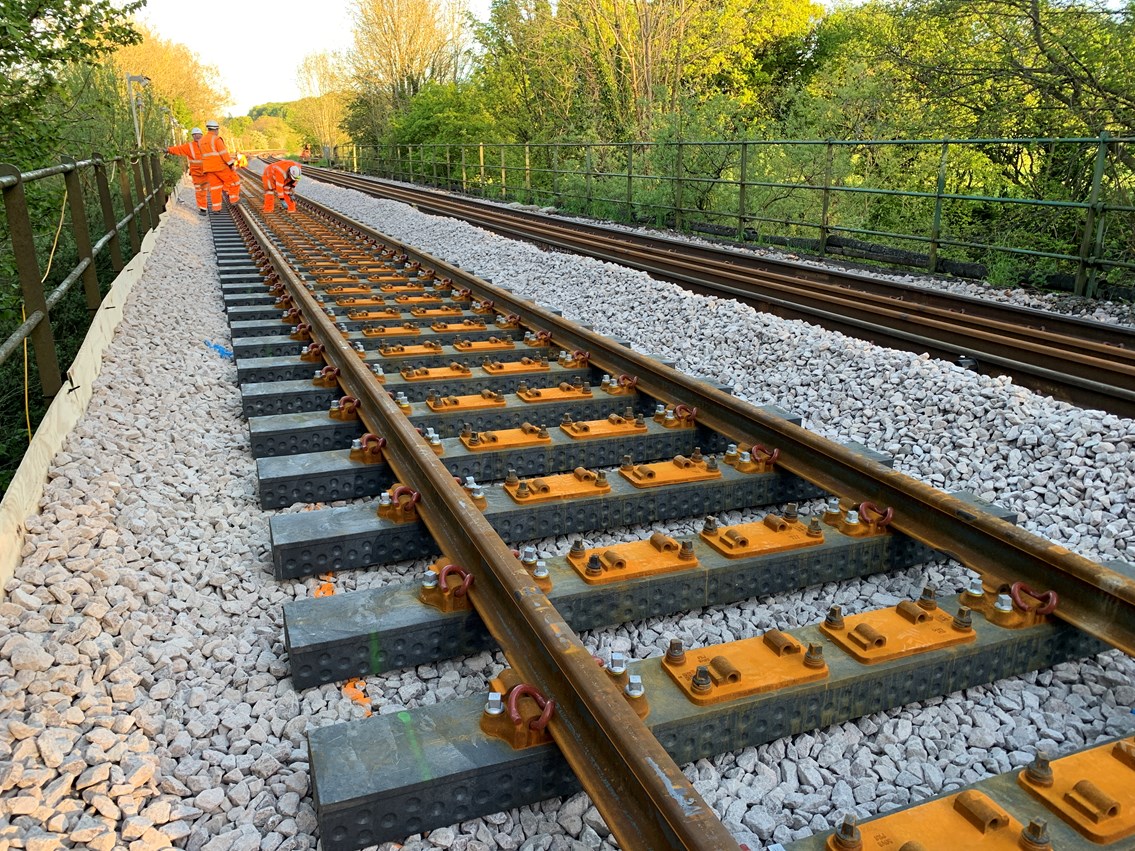Friday 25 Jun 2021
Beyond wood – first recycled plastic railway sleepers laid on Network Rail tracks
- Region & Route:
- Southern
- | Southern: Wessex
Trains in Wiltshire are now running on top of old bottles, food packaging and other unwanted plastics, with the introduction of the first composite railway sleepers on Network Rail’s main line tracks.
Made from recycled plastic, engineers recently installed the environmentally-friendly technology across the weight-restricted Sherrington Viaduct, between Salisbury and Warminster. Previously, track across the viaduct would have had to be fitted with wooden sleepers, as concrete would have been too heavy for the structure. Sleepers sit on the ballast and hold up the rails, keeping them the correct distance apart.
From 31 July this year, creosote-treated softwood sleepers will be banned and the alternative is sleepers made with hardwood. Instead, the new sleepers are manufactured by Sicut Ltd in the UK using a blend of locally-sourced plastic waste that may otherwise end up at landfill.
Rail Minister Chris Heaton-Harris said: “I am proud to see such a positive innovation being used for the first time on the mainline railway.
“Not only are these sleepers made from locally-sourced plastic waste, they need less maintenance and will last longer, underlining our commitment to create a greener, cleaner and more efficient rail network.”
Network Rail’s Wessex route director, Mark Killick, said: “This is an exciting development; use of these recycled sleepers on the Network Rail Wessex route is a first for the overground railway network in Britain.
“Rail is already one of the greenest ways to travel, but we’re committed to even greener and better journeys whether this be changing how we maintain the lineside or finding innovative ways to improve the railway by reusing materials and reducing landfill.
“By using these sleepers, not only are we upgrading the track for customers, they will be travelling on a railway laid using sustainable materials as part of the circular economy.”
Sicut’s CEO, William Mainwaring said: “Sicut is delighted to have been selected by Network Rail as its sole supplier of composite railways sleepers and it was a great pleasure to work with the Wessex Route on the Sherrington Viaduct project. Having proven that our products meet the performance required of modern rail track infrastructure we look forward to working closely with every Network Rail Route and Region to deliver the commercial and environmental savings promised by our technology, while at the same time helping the UK deliver on its commitments on carbon reduction and plastic waste proliferation.”
The recycled composite sleepers will help Network Rail achieve its Zero Carbon 2050 target due to at least a 40% reduction in greenhouse gas emissions from sleeper production and embodying recycled plastic within the track infrastructure for at least 50 years.
The sleepers also offer an increase in service life and reduced maintenance compared with timber sleepers, helping to reduce both whole life costs and the risks to staff when attending site.
Unlike traditional wooden sleepers, composite sleepers do not split, rot or degrade over time and can resist water, oil, chemicals and fungi. Designed for over 50 years of use, when they are eventually replaced, they can be re-used, re-purposed or recycled to make new sleepers or other composite products.
Notes to Editors
Concrete sleepers are still used across most of the network. They are recycled by Network Rail at its March recycling yard, for building aggregate and other purposes.
An EU-wide creosote ban in 2013 had an exemption for railway sleepers until 31 July this year. Softwood sleepers will no longer be used in this country from that date. Hardwood sleepers - the alternative - are mainly sourced from Brazil and are not sustainable.
The new track for Sherrington Viaduct follows a major renewal just a few miles away at Wilton Junction in Salisbury. The busy junction, where trains diverge towards either Bristol and Cardiff or Yeovil and Exeter, was renewed over three weekends to provide a more reliable railway and better journeys.
Contact information
Passengers / community members
Network Rail national helpline
03457 11 41 41
Latest travel advice
Please visit National Rail Enquiries
Journalists
Network Rail press office - Chris Denham
Operational Communications Manager
020 3357 7969
07515 626530
chris.denham@networkrail.co.uk
About Network Rail
We own, operate and develop Britain's railway infrastructure; that's 20,000 miles of track, 30,000 bridges, tunnels and viaducts and the thousands of signals, level crossings and stations. We run 20 of the UK's largest stations while all the others, over 2,500, are run by the country's train operating companies.
Usually, there are almost five million journeys made in the UK and over 600 freight trains run on the network. People depend on Britain's railway for their daily commute, to visit friends and loved ones and to get them home safe every day. Our role is to deliver a safe and reliable railway, so we carefully manage and deliver thousands of projects every year that form part of the multi-billion pound Railway Upgrade Plan, to grow and expand the nation's railway network to respond to the tremendous growth and demand the railway has experienced - a doubling of passenger journeys over the past 20 years.
Follow us on Twitter: @networkrail
Visit our online newsroom: www.networkrailmediacentre.co.uk

